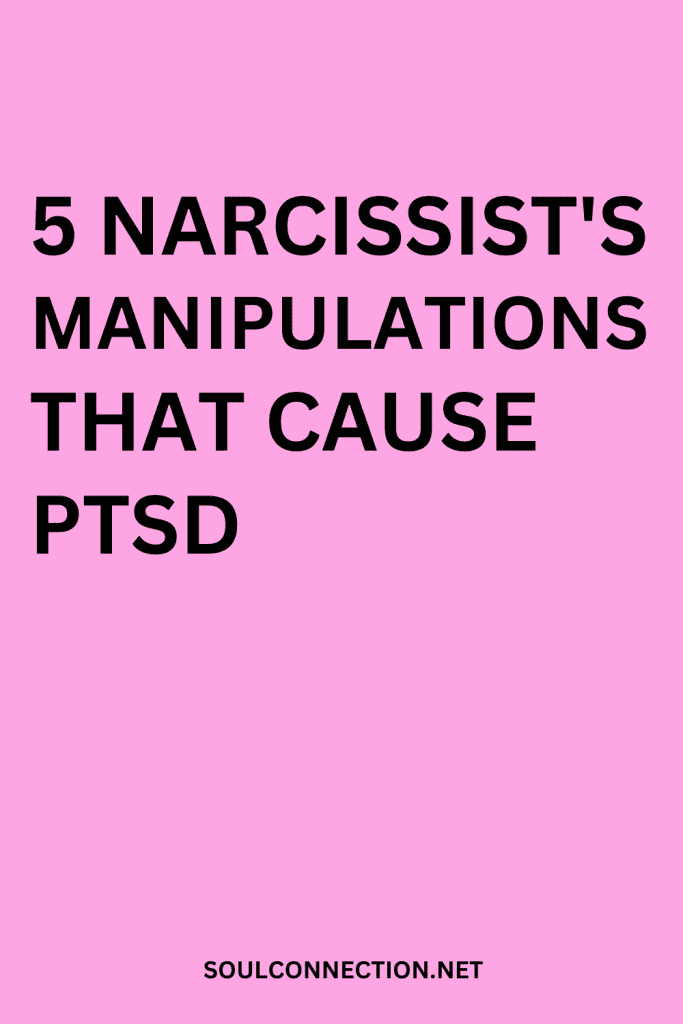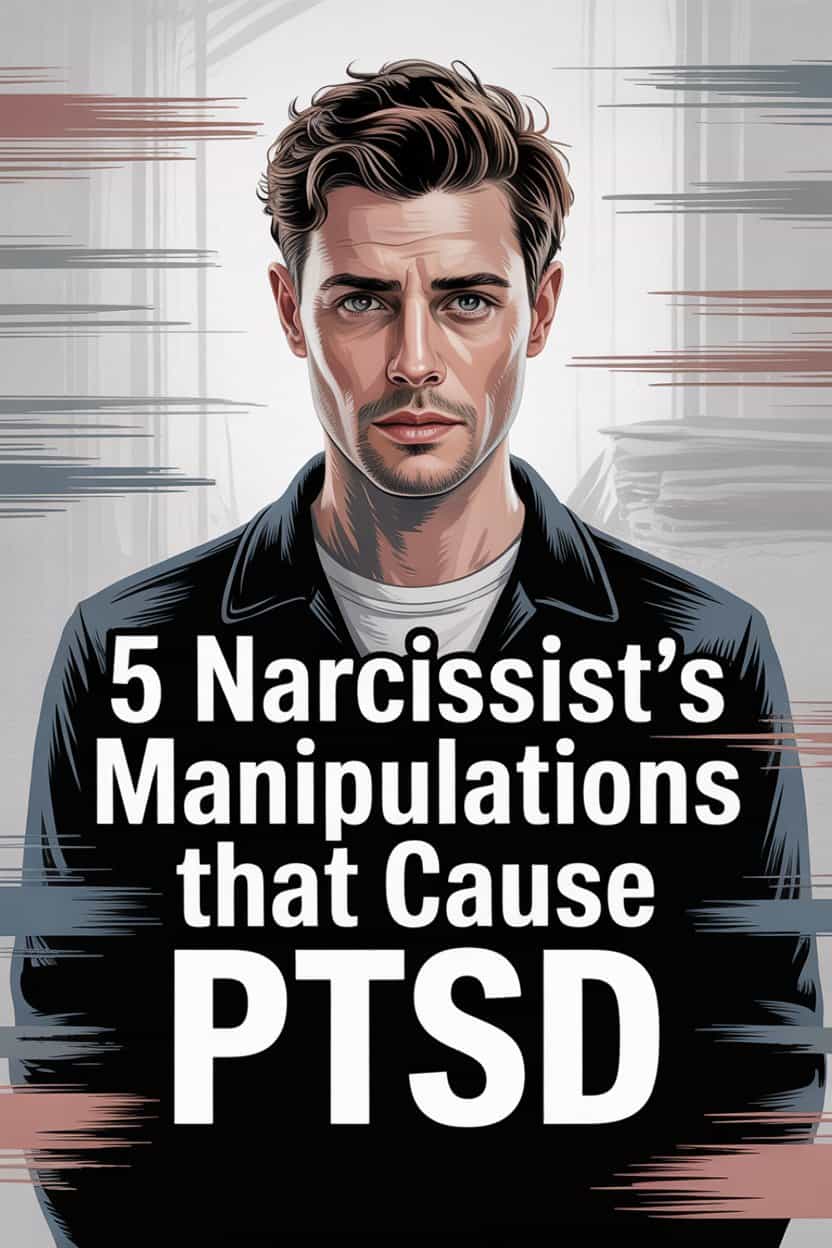Narcissists don’t just steal the spotlight; they steal sanity, self-esteem, and, occasionally, the last slice of pizza. But the real damage isn’t always obvious.
Narcissist manipulation can leave emotional bruises so deep, even years of therapy start to sound like a bargain. When the smoke clears, what’s left can resemble post-traumatic stress disorder—a terrifying souvenir nobody asked for.
Time to shed some light (with a dash of sarcasm) on five manipulations narcissists use that can leave lasting scars, and what you can do to start reclaiming your peace.
1. Gaslighting Until Reality Breaks
Imagine someone rearranging your furniture every night, then acting surprised when you trip over the sofa in the morning. “What do you mean, the couch moved? Maybe you’re just clumsy.”
That’s gaslighting, but instead of furniture, it’s your sense of reality getting the makeover.
Narcissists are pros at this trick. They’ll deny things they’ve said, rewrite history on the fly, or insist you’re imagining problems that are as obvious as a kangaroo in your living room.
Eventually, you start questioning your own memory—and your grasp on reality.
The effects aren’t just confusion. Prolonged gaslighting leads to chronic self-doubt, anxiety, and a suspicion that maybe you really are the problem.
Over time, this relentless rewriting of truth can fry your nervous system and leave you with PTSD-like symptoms: hypervigilance, panic, and a deep mistrust of your own perceptions.
Tonight’s homework assignment (relax, not that kind): Start jotting down factual events, conversations, or texts. Having written proof is like kryptonite for gaslighting. Or for when you just want to remember who actually did forget the milk.
2. Love Bombing and Cruelty—On Repeat
Narcissists operate on a cycle so predictable, you’d think it came with a user manual: intense affection, then sudden coldness. Enter love bombing—a tsunami of flattery, gifts, and attention that would make even your grandma suspicious.
One minute, you’re the center of their universe; the next, you’re wondering if you’ve been ghosted by an amateur magician.
But here’s the kicker: it always swings back. Just as you settle into the warmth, out comes the ice. The love withdraws, replaced by criticism, neglect, or outright contempt.
This emotional whiplash feeds into the trauma loop. Your brain, ever the optimist, keeps hoping the “good” narcissist will come back. Instead, you get stuck in a fog of anxiety, waiting for the next mood swing.
Over time, this unpredictability wires your nervous system for hyperalertness—the very definition of PTSD.
If any of this rings a bell, it’s not your fault for getting hooked. Brains are built to crave dopamine (thanks, evolution). Narcissists exploit that weakness, delivering affection in inconsistent doses.
No need to punish yourself for wanting love—just recognize when the love is more like a rollercoaster without seatbelts.
3. Isolation From Friends, Family, and Reality TV
Narcissists don’t just want your love; they want all of it. Friendships, hobbies, even your relationship with your own mother can suddenly feel like competition.
Slowly, the narcissist chips away at your support system, one passive-aggressive comment at a time.
“They’re jealous of us.”
“Your best friend is just using you.”
“Your family doesn’t understand you like I do.”
It’s not always direct. Sometimes, it’s subtle: engineered conflicts, last-minute plans that just happen to clash with your commitments, or guilt trips about “not caring enough.”
In the end, you find yourself skipping girls’ nights, ignoring texts, and wondering when your world shrank to the size of one person’s ego.
Isolation isn’t just about loneliness, either. Losing touch with outside perspectives makes gaslighting easier. It keeps you dependent, and once you realize what’s happened, the damage can feel irreversible.
PTSD often involves a fear of connecting with others, thanks to the pain of being cut off from your roots.
Want to break the spell? Reach out—even if it’s just a meme to an old friend or a call to your sibling. Rebuilding those lifelines is the first step back to sanity. And don’t let anyone tell you that group chats don’t count as therapy.
4. Blame, Shame, and the Never-Ending Guilt Parade
If narcissists handed out medals for blame-shifting, they’d need a bigger trophy case. Everything is always your fault—their bad mood, their cheating, your lost car keys, the global supply chain crisis.
If you stand still long enough, you’ll find yourself apologizing for the rain.
Here’s how the routine goes: something goes wrong, and all eyes point to you. If you defend yourself, you’re “too sensitive.” If you try to explain, you’re “making a big deal out of nothing.”
Stick around long enough, and you start believing you actually are the cause of all life’s problems.
This relentless blame game isn’t just exhausting; it’s traumatic. Internalized guilt and shame can morph into the kind of self-loathing that PTSD feeds on.
Victims start obsessively analyzing their words, actions, and even thoughts, desperate to avoid the next explosion.
What helps? Get comfortable with the phrase: “That’s not mine to carry.” Seriously, write it on a sticky note and slap it on your mirror. The only guilt you should feel is for not finding this mantra sooner.
5. Threats, Outbursts, and the Weaponization of Fear
Narcissists love drama, but not the kind with popcorn and a happy ending. Their tool of choice? Fear. Outbursts, threats, and angry silences aren’t just bad manners—they’re weapons designed to keep you on edge.
Sometimes it’s overt: “If you leave me, I’ll ruin your life.” Other times, it’s just a simmering anger that makes you tiptoe around them like a mouse in a cat cafe.
Even when things seem calm, there’s always the threat that one wrong move will unleash the storm.
Living in that kind of environment changes your brain. You start scanning for danger even when you’re supposed to be relaxing. Loud noises make your heart race. You flinch at raised voices in movies.
Welcome to hypervigilance, the not-so-fun souvenir of a narcissistic relationship.
Reclaiming your sense of safety isn’t about being fearless. It’s about giving yourself permission to feel safe again. A weighted blanket, a locked door, or just the freedom to choose your own snacks—small things can be surprisingly powerful.
Healing Isn’t Linear (and It’s Not a Solo Mission)
Crawling out from the wreckage of narcissistic manipulation isn’t about “just letting go” (as helpful as that advice from your yoga instructor sounded). PTSD from these relationships isn’t imaginary, and you don’t have to tackle it alone.
Start with the basics: reconnect with your support network, even if it’s a single trusted friend or a therapist who doesn’t recoil at your stories.
Get curious about grounding exercises—think breathing, guided meditations, or just sticking your face in a pile of laundry. (Hey, whatever works.)
Most importantly, give yourself credit. Surviving narcissistic manipulation requires Olympic-level resilience. Healing takes time, and yes, there will be setbacks (and possibly more bad dates).
But every step away from your narcissist’s control is a win.
No one gets through this without a few scars, but scars mean healing is happening.
And if anyone tries to tell you otherwise, tell them your favorite columnist gave you permission to block their number.


